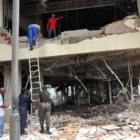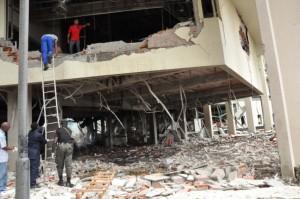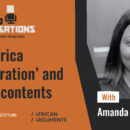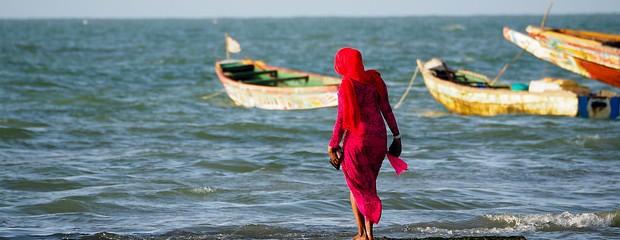African Arguments Editorial – Boko Haram in Nigeria : another consequence of unequal development

An extremely violent Islamist group based in north east Nigeria, Boko Haram has emerged as a significant factor in Nigerian politics and security. Once confined to Maidugri – and driven partly by regional politics – it has now struck in other parts of the north and in the capital Abuja at the centre of Nigeria. Recent attacks in Damataru and Maidugri have claimed over 200 lives.
Two years ago the government claimed victory after the death of its leader, Mohamed Yusuf, after a battle at its headquarters in Maidugri. Film showed the police randomly executing civilians, and apparently murdering Yusuf whilst in police custody. Problem solved said the government. They could not have been more wrong. Boko Haram has re-emerged, more numerous, better armed and utterly ruthless. It is able to access easily deployed weaponry such as hand grenades and small arms as well as more sophisticated explosive devices delivered as car bombs, sometimes by suicide bombers. In August, it bombed the UN building in Abuja. Deploying across a wider area, it has launched head-on attacks on police and army. This suggests increasingly sophisticated co-ordination and the development of internal organisation as well as substantial financial and material backing.
Since 2001 and the start of the US-led War on Terror the temptation has been to interpret all domestic Islamist groups through the prism of international terrorism. This is plausible. Boko Haram or a faction of it – it may not be a monolithic organisation – has had contact with members of Al Qaeda in the Islamic Maghreb (AQIM) and even the Somali “˜Al Shabaab. But the local may be more important than the global. A more fruitful interpretation comes from an examination of Nigerian domestic politics rather than global jihad.
The north-east of Nigeria has been largely excluded from developmental gains that have, to some extent, occurred in other regions of the country, notably the economically explosive region around Lagos. Boko Haram’s central demand – the imposition of Sharia law in Northern states – suggests a rejection of the values of westernising Nigerian society that has produced obscene largesse for a few. In addition, the re-election this year of President Goodluck Jonathan, a Christian Southerner from the Delta region, seemed to further signal the decline in the North’s political power. Since independence the northern political elite have been the deciding factor in who rules the country. In forming the Peoples Democratic Party the northern elite helped create a national party which made sure that power was circulated – rather than shared – so each area took it in turns to be President and “chop” (steal from the public purse).
In the lead-up to this year’s election the north argued that since its President, Umaru Yar “˜Adua, had died in office, they should still retain the presidency. But Goodluck Jonathan, the vice president and a southerner, outmanoeuvred them and was elected President in April. Northerners voted heavily for General Muhammadu Buhari, a northerner and former president who stood aside from the PDP and formed his own party. But he made almost no effort to campaign in the south where his party barely existed and he lost heavily. The resulting fear and anger in the north was expressed by mobs who attacked the houses of prominent PDP leaders.
That anger may also be feeding Boko Haram. However, it is not, or does not appear to be, an organisation run or supported by rich and powerful political figures though it does receive funding from outside Nigeria we are told by Western security agencies. It is a local political movement now fighting a national campaign to pursue its ends. Its recruitment of predominantly unemployed, poorly educated young Muslim men is made possible by the national political failure to provide jobs, health or education. When northern primary school teachers were recently given a national primary-level exam, nearly all of them failed it. Unemployment in northern cities is extremely high. Without a decent future, young men are easily drawn into fanatical movements.
Military action alone will not defeat the movement. The speed at which the organisation recovered from its “defeat” by Nigerian security services in 2009 shows the problem is far from solved. The only long-term solution is the development of the region.







[…] and the development of internal organisation as well as substantial financial and material backing. Read more… Share this:ShareTwitterFacebookLike this:LikeBe the first to like this post. This entry was […]
Sir Boko Haram is not born out of unequal development in Nigeria, Boko Haram movement is baseless, their existence is the lack of proper and sincere Leadership in Nigeria this Nonidelogical Group which is been used by some so called untouchable Godfathers group, security operatives are studying the details recovered from the Lagos based Boko Haram kingpin, who was arrested in Minna in August,Minna the Home of the former Military Head of State Ibrahim Babangida it was gathered that some recovered documents also pointed the finger at some bigwigs in the polity as allegedly sponsoring certain activities of the sect.
Boko Haram owns a website uses s cellphone and the movement is fighting western Education the North East has been wielding political power since Nigeria Independence as a birthright which is one Colonial manipulative blunder.so been excluded from developmental gains in is absolute nonsense,
Boko Haram is part of the world-wide Al Qaeda-sponsored ”global jihad” and if we give them one inch they will definitely take a mile. We cannot afford to have ”peace” with them on their terms alone or ”peace” peace with them at the cost of our hard-earned civil liberties, cherished values and modern way of life.
Boko Haram opposes not only Western education, but Western culture and modern science as well. How can anyone oppose development and turns back to claim unequal development
The group was founded in 2002 in Maiduguri by Ustaz Mohammed Yusuf. In 2004 it moved to Kanamma, Yobe State, where it set up a base called “Afghanistanâ€, used to attack nearby police outposts, killing police officers. Yusuf is hostile to democracy and the secular education system, vowing that “this war that is yet to start would continue for long†if the political and educational system was not changed.